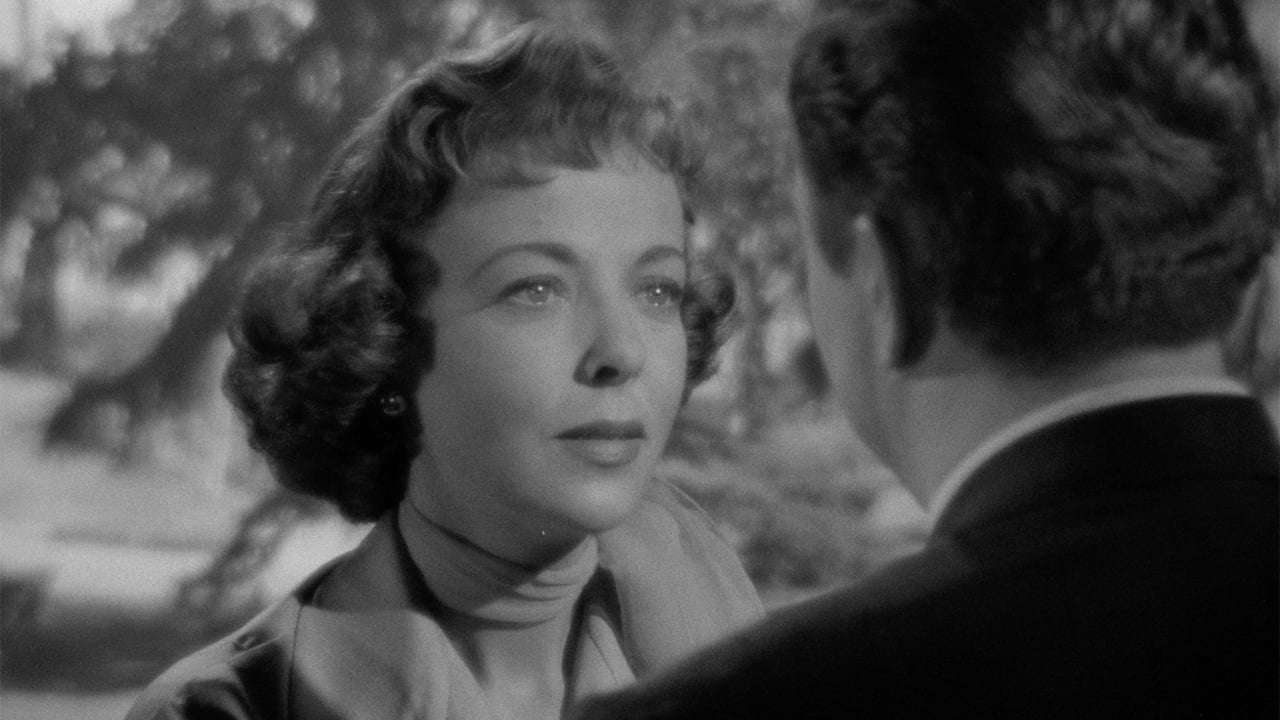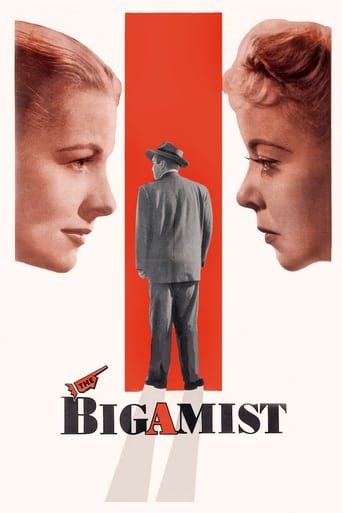

One of a handful of low budget films from pioneering woman film-maker Ida Lupino. Known mainly for her soulful screen portrayals in the 1940's of downtrodden women, she managed this career turn in the early 50's, a remarkable feat given a production industry so thoroughly dominated by men.Her best known feature is the chilling and critically acclaimed account of serial killer Emmet Myers, called "The Hitchhiker". But all her films are marked by an earnest concern for the lives of ordinary people, whether menaced in extreme circumstance or in more ordinary circumstance by the unwed pregnancy of "The Outrage". Moreover, at a time when studios were fending off small screen television with big budget Technicolor, she gamely persisted with the small, the intimate and the unglamorous."The Bigamist" remains an oddity, very much an artifact of its time, but worth viewing for its sensitive handling of male loneliness, a topic for which macho Hollywood has never had much time. The acting is first-rate from a trio of de-glamorized Hollywood professionals, including the poignant Lupino; there's also Edmond O'Brien in a low-key, nuanced portrayal of a man trapped by emotions, showing once again what a fine, intelligent performer he was. Notice how elliptically the pregnancy is presented, and how subtly Fontaine's career woman is projected into the breakup. Both are very much signs of that time. Although the subject matter may have tempted, the results never descend into bathos or soap-opera, even if final courtroom scene appears stagy and anti-climatic. All in all, it's a very well wrought balancing act.Lupino's reputation should not rest on gender. This film as well as so many of her others demonstrate what a versatile and unusual talent she was, whether in front of the camera or behind. Too bad, she never got the recognition from an industry to which she contributed so much.
... View MoreI have to give director Ida Lupino quite bit of credit for the way in which she handled what some directors might have made very sensationalistic. Instead, she directs this with restraint, seemingly saying that normal people do things that are not necessarily accepted...it just happens.The cast does a fine job here. Edmond O'Brien comes across as a sort of "every man", as the traveling salesman who has 2 wives. Joan Fontaine is wife #1, and she and O'Brien are trying to adopt a child. Along comes Edmund Gwenn, as the head of the adoption agency, who has a hunch something is wrong, and discovers the bigamy. Gwenn had the ability to play both heavies and beloved figures...here, it's sort of in-between as he refuses to make another mistake in assigning a child; he's very good here, as he discovers wife #2 -- Ida Lupino, who seems very real and likable, despite the situation. The wonderful Jane Darwell has a minor part as a custodian. Interstingly, Lillian Fontaine -- mother of Joan Fontaine and Olivia DeHavilland -- has a small part as the owner of a boarding house.Ida Lupino, who directed, certainly did have a subtle sense of humor. Early on in the film, Joan Fontaine referred to Edmund Gwenn's character as seeming like Santa Claus (and as you may remember, he indeed did play Santa Claus in "Miracle On 34th Street" six years earlier. And during the bus tour, they show the houses of (among others) Jack Benny, Jimmy Stewart...and Edmund Gwenn! A negative about this film probably has to do with...well, the negative. This film was produced by the production company that Ida Lupino and her husband (Collier Young) formed. Their budgets were thin, but the topics dealt with popular social issues. Lupino herself directed all 6 films made by The Filmmakers company. The films were distributed by RKO. The company folded after this film. The print used on TCM for this (and several of the other The Filmmakers films) is not in particularly good condition. I imagine that is because the negatives/prints were not kept to the higher standards of the large studios. It's not uncomfortable to watch, but in some spots the quality of the negative is a little distracting.I wasn't totally pleased with the ending of the film. What happens to each of them...particularly the women...and children. And who does he come back to after prison? If anyone. Too many loose ends to be totally satisfying, but nevertheless, a well done film.
... View MoreTraveling Salesman Edmund O'Brien is in a spot. He has been caught as a bigamist and tells how he got into this predicament. In San Francisco, he's already married to a sweet lady (Joan Fontaine) who is like every perfect TV wife. Then, while on business in Los Angeles, he goes on a tour of the stars homes and meets Ida Lupino who happens to be on the tour just because she likes to rest on buses. After seeing the homes of James Stewart, Jack Benny, Barbara Stanwyck, Jane Wyman and Edmund Gwenn (who plays the character O'Brien happens to be telling his story to), they go to the Chinese restaurant where Lupino works. One thing after another happens, and O'Brien finds himself proposing to the ailing Lupino. Once everything is exposed, O'Brien ends up in court where the two wives see each other for the very first time.This is more of a character study than the plot of a movie. It feels like it could be more appropriate for a TV anthology series at under an hour. Lupino is an expert director and actress, and like Fontaine's role, her character is extremely likable. It's understandable why O'Brien would be drawn to both of them. Yet, why the man doesn't find a profession to keep him near his first wife (Fontaine) to prevent his loneliness is never addressed. I longed for an actual speaking scene between Lupino and Fontaine who at different times in their lives (Lupino-prior, Fontaine-current) were married to the same man (Collier Young, who happened to write the screenplay). The film takes a long time to grab any interest, and by that time, it's more because you feel sorry for these characters rather than the pace of the movie.I was rather disappointed in the ending which I felt was a letdown. It gives the impression that the writer wanted to let the audience choose whom O'Brien ended back up with. Still, there's a glorious silent smile between Fontaine and Lupino that says more than a hundred words could.
... View MoreWhat's a screen writer to do here? At the end of "The Bigamist" the judge defers announcing his decision until sometime in the future. While this may seem a writing cop out, what's the alternative? Since in this country every state law terms bigamy illegal, it would be unrealistic to have a finale in which a judge fully acquits the accused. At the same time, the writer has presented a pretty sympathetic case for our hero, played expressively by Edmond O'Brien. Likewise, the judge's final comments imply some possible leniency forthcoming. The script allows for no discussion about the rationale for such law in the first place; thus, the basic assumption is made that such practice is most unbeneficial for society. Personally, I would have valued such discourse, perhaps from the adoption officer, craftily played by Edmund Gwenn.Ida Lupino and Joan Fontaine round out a stellar cast, all of whom work together with great emotional sensitivity. Unfortunately, the script isn't quite up to the level of these fine talents, and it is this drawback that ultimately diminishes the total value of "The Bigamist."
... View More